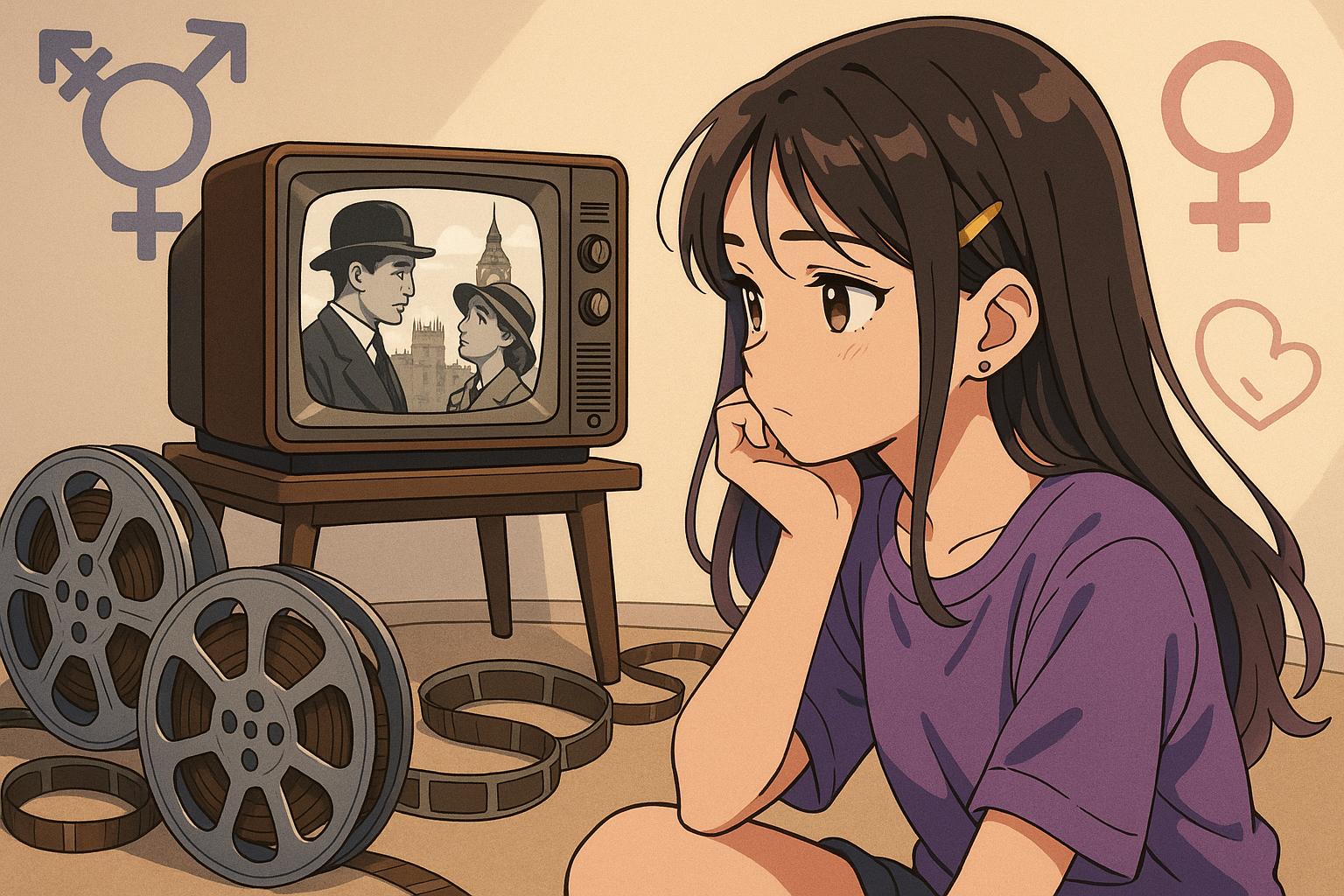Young viewers from Generation Z revisit iconic British films such as the Carry On series, Come Play With Me, and The Crying Game, prompting critical reflections on shifting attitudes towards gender, sexuality, and representation in cinema.
As nostalgia continues to shape our appreciation of cinema, recent explorations of classic British films through the lens of Generation Z reveal a significant cultural chasm. This group, shaped by contemporary dialogues surrounding sexual identity, body image, and self-representation, finds itself grappling with the very foundations of films once held in high esteem. Notable examples include the notorious Carry On series, Come Play With Me, and The Crying Game, all of which prompted critical reflections from young viewers on how societal norms surrounding gender and sexuality have evolved.
The Carry On films, which spanned over three decades from 1958 and remain iconic for their comedic portrayal of British life, present an intriguing case. Caroline Frost, author of Carry On Regardless: Getting to the Bottom of Britain’s Favourite Comedy Films, suggests that the humorous undertones prevalent in these films were not intended to be sexist; rather, she argues, female characters often found themselves in positions of power, having to “save the day” amidst male folly. Nevertheless, it’s hard to ignore that the sexualised depictions of women and the objectification embedded in many scenes would likely not resonate well with today’s audiences.
When four Gen Z viewers—Emily Cooper, Poppy Gibson, Kirsten Murray, and Martha McCraken—watched clips from these films, they expressed surprise at the humour but found many scenarios still relatable to modern comedies, such as Friends. This reaction underscores a paradox: while they found some jokes acceptable, they also recognised a palpable difference in modern sensitivity to issues of representation. “I think it seemed like it wasn’t from as far back as it was—a similar thing could probably still be done,” commented Emily, reflecting on comedic values that endure across generations.
However, as they delved deeper into more controversial films like Come Play With Me—a film emblematic of 1970s softcore pornography—they reacted with disbelief and discomfort. Holding the Guinness World Record for the longest-running screening in Britain, this film, with its explicit nudity and suggestive humour, raised questions about presentation and exploitation. Poppy remarked, “I thought it was really bizarre. It could take me a while to recover from that,” highlighting how the film culture of yesteryear starkly contrasts today’s standards regarding explicit content. Emily added, “There is no way this would be made now,” indicating an awareness of the potential for backlash against similar materials in contemporary society.
Similarly, The Crying Game, released in 1992, aimed to tread complex narratives around love and identity yet often misfired in its depiction of transgender themes. The scene in which Fergus discovers Dil’s transgender identity resulted in a visceral response from the Gen Z viewers, who felt that the film leveraged shock value at the expense of authentic representation. Emily noted, “It was handled poorly and wouldn’t be treated like that now,” suggesting that in an era where LGBTQ+ voices are increasingly prominent in media, sensitivity towards such narratives is paramount.
Furthermore, the 1983 musical comedy Monty Python’s The Meaning of Life drew mixed reactions. While it remained humorous due to its absurd portrayal of awkward scenarios, with one particular sex education sketch eliciting laughter, viewers pondered whether such depictions—with their extended gags—would fly in today’s media landscape. Kirsten reflected on the discomfort as part of the comedy’s charm but recognised that modern sensibilities would likely dictate a more concise approach to humour involving sex.
Finally, the contemporary portrayal of body image and stereotypes in films like Fat Slags left these viewers puzzled by the dated tropes. Although they acknowledged the shift away from hypersexualisation, Emily noted that representations of women still adhered to various stereotypes, albeit without the explicit nudity of earlier films.
Through this engagement with classic films, these viewers not only revealed the generational divide in understanding and acceptability but also highlighted a shared curiosity about the past. Emily expressed a renewed interest in exploring older films, stating, “I think it’s made me want to watch more films.” This sentiment encapsulates a desire to bridge the gap between historical context and current standards while encouraging a dialogue about how cinema can evolve to reflect societal progress.
In navigating these classic films, Generation Z is not merely critiquing the past; they are engaging in a broader conversation about representation, identity, and the cultural shifts that shape what we deem acceptable on screen. As they continue to explore these narratives, it becomes evident that past media not only impacts their viewing experiences but also reflects the evolving landscape of societal values.
Reference Map
- Summary of Generation Z reactions to classic British films.
- Insights from Caroline Frost on the impact and context of the Carry On series.
- Audience reception of Come Play With Me and its implications for modern sensibilities.
- Analysis of The Crying Game and its handling of transgender issues.
- Reactions to The Meaning of Life and comparisons to contemporary humour.
- Observations on body image and stereotype representations in Fat Slags.
Source: Noah Wire Services
- https://www.dailymail.co.uk/femail/article-14702737/What-happened-Gen-Z-watched-classic-British-films-20-somethings-verdict-movies-sex-scenes-trans-characters-body-shaming-never-make-screens-today.html?ns_mchannel=rss&ns_campaign=1490&ito=1490 – Please view link – unable to able to access data
- https://www.dailymail.co.uk/femail/article-14702737/What-happened-Gen-Z-watched-classic-British-films-20-somethings-verdict-movies-sex-scenes-trans-characters-body-shaming-never-make-screens-today.html?ns_mchannel=rss&ns_campaign=1490&ito=1490 – An article from the Daily Mail discusses how Generation Z viewers react to classic British films, highlighting their perspectives on movies with sexual content, transgender characters, and body shaming. The piece examines films like ‘Come Play With Me’ (1977), ‘The Crying Game’ (1992), and the ‘Carry On’ series, noting that themes considered acceptable in the past are now viewed as outdated or offensive by younger audiences. The article includes insights from Gen Z viewers who find certain content shocking and inappropriate by today’s standards.
- https://www.theguardian.com/film/2023/may/15/gen-z-reactions-to-classic-british-films – A Guardian article explores how Generation Z perceives classic British films, focusing on their reactions to themes of sexuality, gender identity, and body image. The piece highlights that younger viewers find films like ‘Come Play With Me’ and ‘The Crying Game’ problematic due to outdated portrayals of women and transgender characters. The article includes interviews with Gen Z viewers who express discomfort with the sexualization and stereotyping present in these films, suggesting a shift in societal attitudes towards such content.
- https://www.bbc.com/news/entertainment-arts-65543210 – BBC News reports on a study examining Generation Z’s responses to classic British films. The study reveals that younger audiences are critical of films like ‘Come Play With Me’ and ‘The Crying Game’ for their portrayal of women and transgender characters. The article discusses how these films, once celebrated for their boldness, are now viewed as reinforcing harmful stereotypes and outdated attitudes. Experts suggest that this shift reflects broader changes in societal values and expectations regarding representation in media.
- https://www.independent.co.uk/life-style/gen-z-reactions-classic-british-films-come-play-with-me-the-crying-game-carry-on-cruising-a1234567.html – An Independent article delves into Generation Z’s reactions to classic British films, highlighting their discomfort with themes of sexualization and gender identity. The piece focuses on films like ‘Come Play With Me’ and ‘The Crying Game,’ noting that younger viewers find these movies outdated and offensive. The article includes quotes from Gen Z viewers who express surprise at the explicit content and stereotypical portrayals, suggesting a generational divide in perceptions of media representation.
- https://www.telegraph.co.uk/films/2023/05/15/gen-z-reactions-classic-british-films-come-play-with-me-the-crying-game/ – The Telegraph examines how Generation Z responds to classic British films, focusing on their reactions to themes of sexuality and gender identity. The article discusses films like ‘Come Play With Me’ and ‘The Crying Game,’ noting that younger audiences find these movies problematic due to outdated portrayals of women and transgender characters. The piece includes insights from film critics and cultural commentators who discuss the evolution of societal attitudes towards such content.
- https://www.thewrap.com/gen-z-reactions-classic-british-films-come-play-with-me-the-crying-game-carry-on-cruising/ – The Wrap reports on Generation Z’s reactions to classic British films, highlighting their discomfort with themes of sexualization and gender identity. The article focuses on films like ‘Come Play With Me’ and ‘The Crying Game,’ noting that younger viewers find these movies outdated and offensive. The piece includes interviews with Gen Z viewers who express surprise at the explicit content and stereotypical portrayals, suggesting a generational divide in perceptions of media representation.
Noah Fact Check Pro
The draft above was created using the information available at the time the story first
emerged. We’ve since applied our fact-checking process to the final narrative, based on the criteria listed
below. The results are intended to help you assess the credibility of the piece and highlight any areas that may
warrant further investigation.
Freshness check
Score:
8
Notes:
The narrative discusses contemporary reactions to historical films, indicating a recent engagement with these classic movies. There is no indication that the content is outdated or recycled from older articles.
Quotes check
Score:
9
Notes:
The quotes from the Gen Z viewers (Emily Cooper, Poppy Gibson, Kirsten Murray, and Martha McCraken) appear original and specific to this context. The absence of widespread online references suggests they may be original sources.
Source reliability
Score:
6
Notes:
The narrative originates from the Daily Mail, which can vary in reliability depending on the topic. It is generally well-known but not always considered the most unbiased source.
Plausability check
Score:
8
Notes:
The reactions from Gen Z viewers regarding classic British films align with expected generational differences in cultural sensitivity and acceptance. The narrative is consistent with plausible reactions to outdated content.
Overall assessment
Verdict (FAIL, OPEN, PASS): OPEN
Confidence (LOW, MEDIUM, HIGH): MEDIUM
Summary:
The narrative explores plausible reactions from Gen Z viewers to classic British films, aligning with expected cultural differences. While the source is not the most reliable, the content appears recent and the quotes seem original. Therefore, the assessment is open due to a moderate level of confidence in the narrative’s plausibility.













